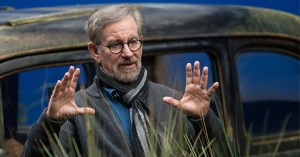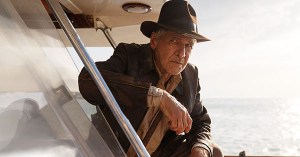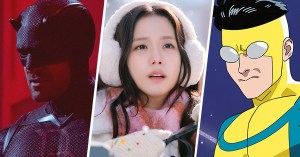Patrick Stewart’s Jean-Luc Again Faces Q in Star Trek: Picard Season 2
Stewart, his costars, and executive producer Akiva Goldsman offer a look at the new season, in which Jean-Luc and his team are tested by the extra-dimensional being obsessed with the Starfleet veteran.
Although Star Trek: Picard trades on a lot of the affection Trekkies have for Star Trek: The Next Generation, it is very consciously its own program. Set just before the 25th century begins, the series, which returns for season 2 on Paramount+ this week, sees a much older Admiral Jean-Luc Picard (Patrick Stewart) facing up to the realities of a galaxy still in turmoil from the destruction of Romulus — the inciting incident of the current Star Trek film series, oddly enough — and some of the older resentments and prejudices unearthed when the Federation faced one of its darkest days. For Picard, Starfleet’s abdication of its duty in that crisis led to years of self-imposed exiled on his family’s vineyard.
As executive producer Akiva Goldsman put when Rotten Tomatoes spoke to him, Stewart, and other members of the cast recently, the show’s first season was always meant to be a “resurrection” for the title character. Now that his resurrection has occurred in both a literal and metaphorical sense, the next step in Picard’s later life journey is “redemption.”
“We restored physical competence — not that it was really lost — and the idea that he was in a body that functioned,” Goldsman said. “Now, we want to talk about psychological competence. We want to talk about the ability to chart uncharted territory in his life, not necessarily that which is in space.”
In the early episodes of season 2, that notion is examined via very specific lens: Picard’s tendency to stand alone.
When he was first introduced in Star Trek: The Next Generation, Picard was meant to be more of a hard-ass, uncomfortable around the families and children aboard the U.S.S. Enterprise. This original concept from series creator Gene Roddenberry softened over time.
“The merging of the fictional character and of myself became closer, and closer, and closer, more and more intense,” Stewart said. Nevertheless, Picard always maintained a certain level of distance despite several opportunities for closer bonds, romantic relationships, and family across TNG’s seven seasons and four feature films. And with decades of hindsight, it is possible to access Picard’s reticence in a different way. “An active life [captaining a starship],” Stewart said, “was a form of escapism.”
“There were things in his past — particularly in his childhood — which had happened to him and which he had intentionally, we believed, misunderstood and used in his life in an inaccurate way,” he continued.
The perception of those events, some revealed for the first time in Picard’s second season, are at the crux of the story and foremost in Picard’s mind even before situations take him to another reality. But more on that later.
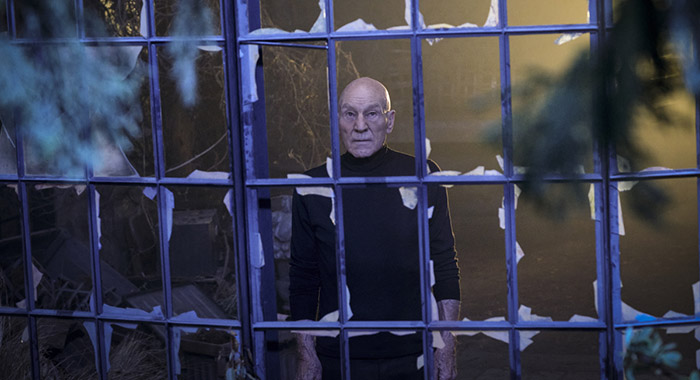
(Photo by Trae Patton/Paramount+)
Picard’s isolation as a starship captain is not unique. Indeed, each of Roddenberry’s central characters faced being apart from people with families. Captain Christopher Pike (Jeffrey Hunter) literally expresses his discomfort with his loneliness in the original Star Trek pilot – a sensation seemingly mitigated by the time we meet him again on Star Trek: Discovery (played by Anson Mount, who will continue to play him in the upcoming Star Trek: Strange New Worlds). His replacement in the Enterprise’s center seat, James T. Kirk (William Shatner), also shares some dismay about standing alone in Star Trek II: The Wrath of Khan, Star Trek V: The Final Frontier, and Star Trek: Generations. That connection between the characters may come from Roddenberry’s own admiration for C. S. Forester’s Horatio Hornblower.
According to Stewart, “When I asked him, ‘Tell me about Jean-Luc. Tell me about who he is, and his life, and his background.’ [Gene] said, ‘Have you ever read any Horatio Hornblower?’ And as it happened, I had. He said, ‘Well, read a bit more and you’ll find out.’”
The character is skilled and well-suited for leadership roles, but often suffers from bouts of loneliness and sadness. He also has a habit of isolating himself and disregarding his virtues.
Goldsman agreed that the Hornblower is an aspect of the way Roddenberry constructed his captains and something to examine via the characters he left to Star Trek. “I think there’s a man alone on the prow thing that is fun to undo in a funny way,” he said. “And, at the same time, honor the idea that even through self exploration or especially through self exploration, these men — and now men and women — become even more the captains they could be by having looked inward.”
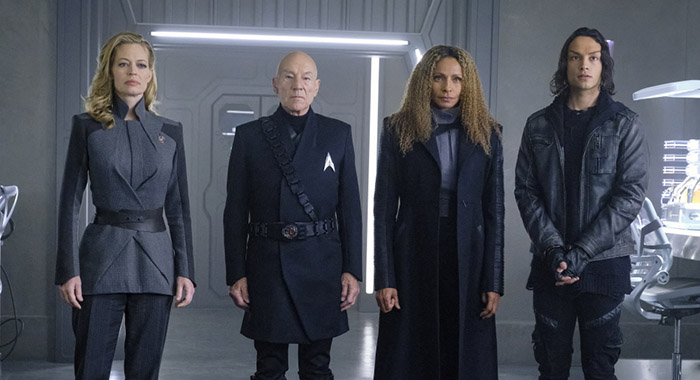
(Photo by Trae Patton/Paramount+)
Or course, some might say Pike, Kirk, and Picard all had families in the form of their bridge crews. Goldsman suggested the dichotomy of people without families forming these close bonds on starships is an “as yet un-illuminated challenge in Starfleet life.” Offering a little hint at Strange New Worlds, he said some of that challenge will be explored in that show, but viewers should not see Picard’s solitary nature as a “de-facto function of Starfleet captains.”
The sense of found family also occurs within Picard’s crew as well. Although circumstances have separated Raffi Musiker (Michelle Hurd), Cristobal Rios (Santiago Cabrera), Dr. Agnes Jurati (Alison Pill), Elnor (Evan Evagora), Soji (Isa Briones), and Seven of Nine (Jeri Ryan) from La Sirena in the gap between seasons, the bonds they forged during their mission together remain.
For one thing, Raffi is keeping an eye on Elnor, even if it means returning to Starfleet’s orbit.
“She’s kind of adopted him. She’s kind of his mentor,” Hurd said. “She can keep an eye on him and try to keep him safe. I feel that’s what she wanted to do.” Nevertheless, Raffi’s disagreements with Starfleet remain: “She’s never going to fully give over trust to Starfleet, but she’ll be there to fight the good fight, for sure,” Hurd explained.
Elnor, meanwhile, must reconcile his commitment to absolute candor while living among Federation citizens who still employ a complex decorum to spare other people’s feelings.
“I think he’s still trying to navigate that, how his past self fits into the idea of what he wants to be and what he wants to achieve,” Evagora said of Elnor’s situation as the seasons begins. “I think he’s in a better place and he doesn’t speak the truth as much as he should — and that’s not necessarily in a bad way either.”
But whether or not the Romulan will find a place to belong within the Federation remains to be seen.
Elsewhere in space, Rios has taken on a new role.
“[He] couldn’t turn this big job down,” Cabrera teased. “I think that’s part of his story in a way, is he comfortable with that decision? … It is very much about identity and searching for his truth and his time. And that’s going to be sort of a theme throughout this season. So it’s a great starting point.”
His new situation also keeps him in contact with Soji and Dr. Jurati, who are both engaged in a diplomatic situation with a nearly forgotten Star Trek alien race as the season opens.
“I think with Soji, we finally get to see her in a state of not being … not crying, not dying, not being hunted, all those things,” Briones said. “We get to see her take on a role that is a huge responsibility. She’s going around to different planets and being this model of what synthetics are, who they are, and why they’re not to be seen as a threat.” Of course, the suspicion of synthetics remains and the memories of what occurred on Mars that fateful First Contact Day will not be easily forgotten. Nevertheless, Briones felt Soji message has the potential to make those tensions subside. “Look at what this place could be if we all just cooperated and looked at each other with open eyes and open hearts, instead of fearing the unknown and fighting the unknown, but actually leading with openness,” she explained.
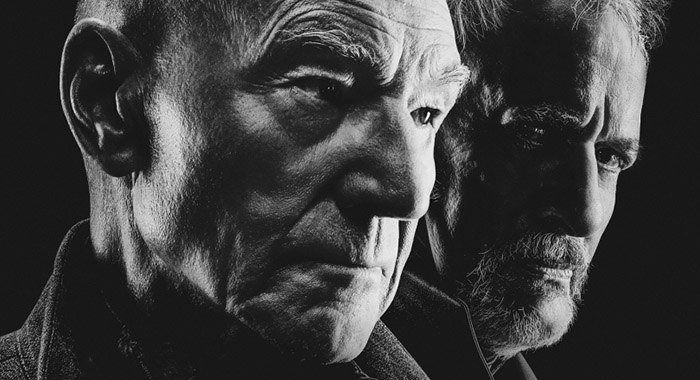
(Photo by James Minchin/Paramount+)
Based on these few glimpses into the season’s opening moments, it is easy to see how this season could progress. But since the show may no secret Q (John de Lancie) would be returning to Picard’s life after a 30-year absence, viewers also know Picard’s second (or is it third?) bridge crew family are in for a wild ride in both a fascistic alternate present and a trip back to one of the most dangerous places in any timeline: 21st Century Los Angeles.
The impish member of the Q Continuum has been a part of Star Trek lore as long as Picard. Their sparring – which occurred at least once a season (except for season 5) – is one of that show’s greatest elements. In fact, Q’s “trial” of humanity via Picard served as fuel for the program’s final story, “All Good Things …,” but even as he announced that the trial never really ends, the character disappeared from the Enterprise, plaguing Star Trek: Voyager’s crew several times and, most recently, finding himself ignored by Star Trek: Lower Deck’s main characters.
As far as Stewart can recall, Q was never posited as a possible feature film adversary and De Lancie admitted to some disappointment in that, but also came to an acceptance.
“As I said before, you can’t spend your life hoping that you’re going to be invited to somebody’s dinner party,” he explained. But with Picard came the opportunity for one last chance to try the case. Although, it is possible Q’s never-ending trial is just a pretext for something else.
“I play a god with clay feet, an omnipotent being too stupid to know it; the life of the party, but really lonely,” De Lancie explained. That loneliness certainly inspires his attempts to strike up relationships with the likes of Kathryn Janeway (Kate Mulgrew) and Benjamin Sisko (Avery Brooks), but something will always bring him back to Picard. “Probably, my main squeeze is Picard,” the actor said.
Nevertheless, Q is “very concerned” to see his old sparring partner in a similarly lonely place after all these years. “Concerned enough for me to be turning the universe upside down for him,” De Lancie said, which leads Picard and his new team into a darker “road not taken,” as seen in the Season 2 trailers. Of that road, De Lanice teased, “buckle up my friend, we’re taking a ride, whether you like it or not.”
And as much as it will expose Picard’s choice to remain secluded in his ready room or his vineyard, it will also take the others to a new place where their lives are very, very different. The most dramatic example, as teased in the previews, is an unassimilated Seven. Her reflection is Q’s new version of reality brings back the character’s key struggle from Voyager: balancing her humanity with the Borg elements that remain.
“That’s always been her struggle,” Ryan said. “To find out who she really is. We haven’t seen her completely be comfortable with either part of herself yet.” One example, as established in the first season, is her inconsistent use of her human name, Annika. “I think she’s still trying to balance that,” Ryan said – a balance she may have to confront quickly in the darker version of Starfleet.
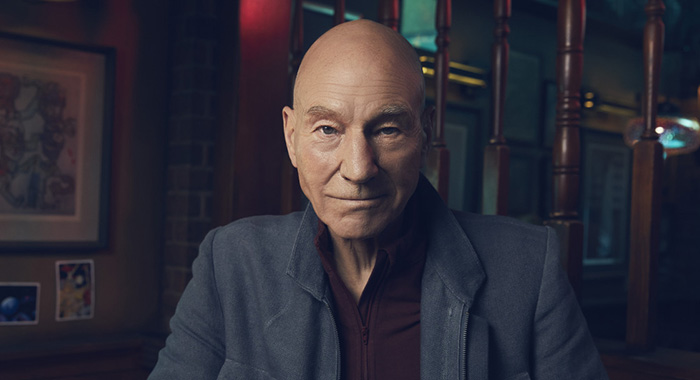
(Photo by Sarah Coulter/Paramount+)
Picard and the others also need to be nimble as events take them to our present day. Or, at least, Star Trek’s version of our present day – a time headed for one of the darkest periods of Star Trek lore. But considering where Picard’s story is going, discussing it further might constitute a spoiler. Instead, we’ll leave you with this tease for the third season, currently in production. According to Stewart, Picard’s core misunderstanding about his family was the most “fascinating” element pitched to him and it “really gets some exposure in these three seasons.”



